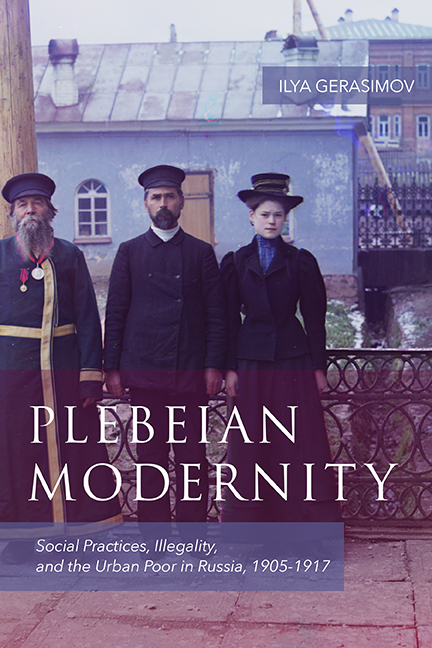Book contents
- Frontmatter
- Contents
- Acknowledgments
- Note on Editorial Conventions
- Introduction: The Subalterns Speak Out: Gerasim and the Infamous
- 1 Writing Degree Zero, and Beyond: Reading Social Practices between the Lines
- 2 The Middle Volga City as the Middle Ground: Urban Plebeian Society
- 3 The Patriarchal Metropolis: Trespassing Social Barriers in Late Imperial Vilna
- 4 “We Only Kill Each Other”: The Anthropology of Deadly Violence and Contested Intergroup Boundaries
- 5 The Transformative Social Experience of Illegality
- Epilogue: Gerasim in Power: A Plebeian Modernity
- Notes
- Selected Bibliography
- Index
2 - The Middle Volga City as the Middle Ground: Urban Plebeian Society
Published online by Cambridge University Press: 09 June 2021
- Frontmatter
- Contents
- Acknowledgments
- Note on Editorial Conventions
- Introduction: The Subalterns Speak Out: Gerasim and the Infamous
- 1 Writing Degree Zero, and Beyond: Reading Social Practices between the Lines
- 2 The Middle Volga City as the Middle Ground: Urban Plebeian Society
- 3 The Patriarchal Metropolis: Trespassing Social Barriers in Late Imperial Vilna
- 4 “We Only Kill Each Other”: The Anthropology of Deadly Violence and Contested Intergroup Boundaries
- 5 The Transformative Social Experience of Illegality
- Epilogue: Gerasim in Power: A Plebeian Modernity
- Notes
- Selected Bibliography
- Index
Summary
Multifaceted Diversity at the Core of Empire
The first step in adapting the sociological concept of “plebeian society” for a historical study is to localize and contextualize its application—for example, “Russian urban plebeian society.” Here, “urban” refers to big cities that served as melting pots of people of particular, differentiated mindsets into a common space produced by the “infamous men.” But what difference does it make when a plebeian society is identified as Russian? Even when using “Russian” in the same way as “urban,” thus further defining the location by referring to the borders of the Russian Empire, the question remains: Did all those “Russian” urban centers have the same plebeian society? What, if anything, was Russian about plebeian society?
A recent attempt by a group of leading Russian historians to produce a series of studies of Russian imperial borderlands has yielded an unexpected answer to these questions. By singling out distinctive external parts of Russia proper (the Baltic provinces and Poland, the Caucasus and Central Asia, Bessarabia and Siberia, etc.), these studies have vividly demonstrated something that was rarely understood before: the Russian Empire may have had a periphery, but it lacked any clear-cut and homogeneous core. Even the ultimate heartland of the Russian Empire—the proverbial Russian river Volga— was as multiethnic, multiconfessional, and economically diversified a region as many of the recognized borderlands were. This means that diversity was not a marker of imperial regions that were somehow different from the norm of the core, but of the fundamental principle of Russian imperial formation as such. After the Revolution of 1905, this structural diversity of regions and populations was complemented by the unprecedented upheaval caused by new social mobility, both upward and horizontal (migrations). The most modern loci of the Russian Empire, its urban centers, became the testing grounds for imperial society's ability to accommodate this dramatic escalation of its diversity, including the rise of a profoundly different “nonspeaking” plebeian society. Two major cities of the Middle Volga region, Nizhny Novgorod and Kazan, reveal a situation in the deep heartland of the empire that by no means could be seen as the empire's normative (homogeneous and dominating) core.
- Type
- Chapter
- Information
- Plebeian ModernitySocial Practices, Illegality, and the Urban Poor in Russia, 1906–1916, pp. 55 - 80Publisher: Boydell & BrewerPrint publication year: 2018

